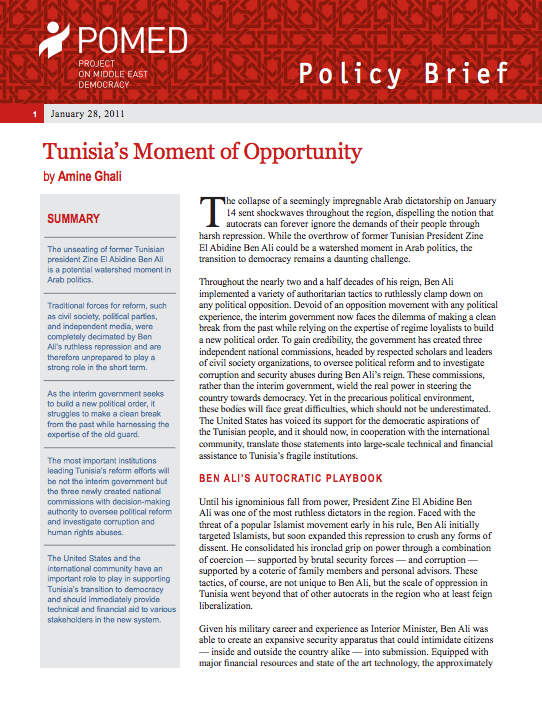For a full text copy of the brief, click here.
The collapse of a seemingly impregnable Arab dictatorship on January 14 sent shockwaves throughout the region, dispelling the notion that autocrats can forever ignore the demands of their people through harsh repression. While the overthrow of former Tunisian President Zine El Abidine Ben Ali could be a watershed moment in Arab politics, the transition to democracy remains a daunting challenge.

POLICY RECOMMENDATIONS
- Demonstrate clearly its support for democratic efforts in Tunisia without endorsing specific political parties or ideologies. President Obama’s statement on Tunisia in the State of the Union address sent a strong, clear message; similar statements should be delivered frequently by high level U.S. government officials to dissuade undemocratic forces from destabilizing the fragile system.
- Provide technical support to the new government, especially the national commissions. Although the commissions are primarily composed of technocrats, the challenges they face are of an entirely new nature and will require the help of international experts, as well as financial resources and tools, to successfully carry out their mandates.
- Encourage European allies, particularly those with close ties to Tunisia (Italy, France, Germany, and Spain) to help foster democratic reforms in the country through economic incentives. Partly because of its history, and partly because of its geographic proximity, Europe wields more influence in Tunisia than the United States. As such, the European Union should take the lead in encouraging reform by increasing access to European markets for Tunisian exports and increasing access to financing. The Partnership Agreement signed between Tunisia and the European Union could be the legal framework for such incentives.
- Support different actors in the country (political parties, civil society, media, unions, and professional associations) in order to create a vibrant pluralistic system. After years of dominating the political space, Ben Ali’s regime succeeded in crushing the traditional agents of reform in the country. The United States should offer technical support in the form of trainings to equip each of these players with the skills necessary to contribute to the new political order, and it should support efforts to foster strong relationships between all of these institutions and their counterparts in the West and in other Arab countries.




|
Consolidating Power: Tunisian President Kais Saied’s Crackdown on the Judiciary